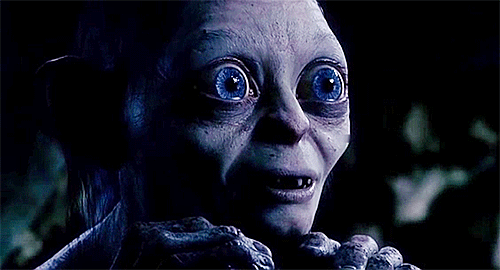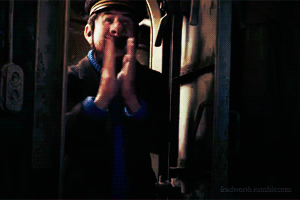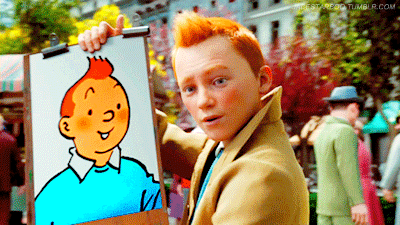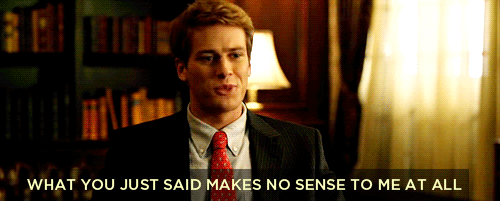I’m not in favor of 3D rereleases. They’re a cheap way for studios to make a ton of money with minimal effort, and I had never seen one before. That said, when I saw the original trailer for the Jurassic Park 3D rerelease, I decided then and there that I had to see it.
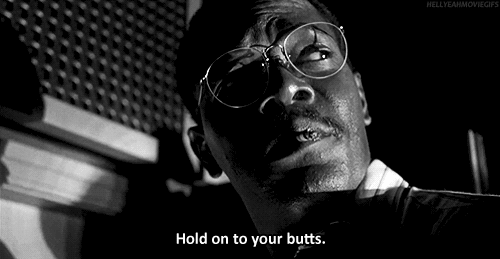
I can’t even explain it in words. There’s something so magical about Jurassic Park that I can watch it on repeat and never get tired of it. It’s so big, it’s so fun, it’s so adventurous. Jurassic Park taught me that movies can do anything.
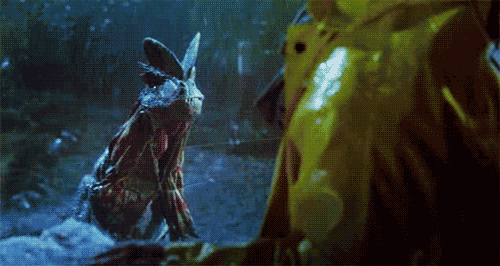
Jurassic Park was the highest grossing film of all time when it came out, passing 1982’s E.T. and eventually losing the title to 1997’s Titanic. Universal told Spielberg he had to make the film between 1991’s Hook and 1993’s Schindler’s List, because they knew he wouldn’t want to make it if they let him do Schindler’s List first. After over two-years of writing the script, casting, and designing the dinosaurs, they filmed in Hawaii, California, and Arizona.
To be honest, I hadn’t seen the film all the way through in at least… okay about a year. This time I was watching as a film student, but almost instantly I was brought back to that childhood state where the science is all plausible and the dinosaurs are real.

The shot of the cup still gave me chills. It has a visual power that I just can’t wrap my mind around, because it means the action of the film is about to begin. The T-Rex is coming. The raw, unbridled power of mother nature and evolution that has not set foot on this planet in 65 million years is headed this way. You can’t manufacture that kind of power.
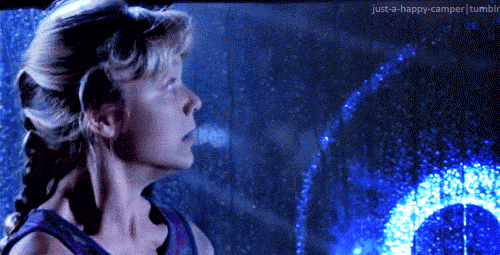
And the more I watched, the more I understood the film and why it struck a chord with me as a child. Aside from inspiring a dinosaur obsession that lasted probably into my teen years, Jurassic Park is a film about the power of filmmaking. Spielberg has said that he altered the book version of the park’s creator, John Hammond, from a ruthless businessman into a friendly grandfather figure, because he relates with the character. And it suddenly clicked that the argument Hammond makes for why he creates the dinosaurs is the same one Spielberg would have made for using computer animation for the dinosaurs in the film. If the technology exists, man has a right to control it. Jurassic Park defied every filmmaker in the business who thought computer animation was the debasement of film, that those who used it did not know how to use it correctly.
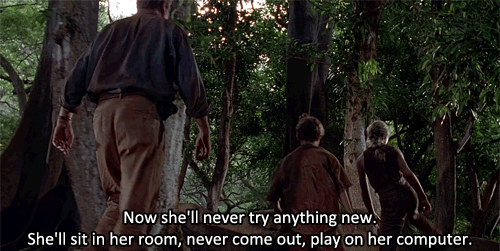
Okay it’s sounding farfetched, but stay with me. Spielberg had to discover several new types of special effects techniques to create the dinosaurs. His work was considered revolutionary, and inspired a whole list of big blockbuster-directors like Peter Jackson and Stanley Kubrick. The key difference that the film illustrates is that Hammond has no respect for the kind of power he is wielding, and he is therefore punished for trying to maintain control by losing control of everything, and almost losing his grandkids. He is mad for power, and as Dr. Malcolm explains, “Genetic power is the most awesome force the planet’s ever seen, but you wield it like a kid that’s found his dad’s gun." Spielberg uses Hammond’s failure to explain that nature is a powerful force that needs to be handled with care. A balance between technology and respect, the same way Spielberg balanced computer generated graphics with old-fashioned, hand-made latex dinosaurs.
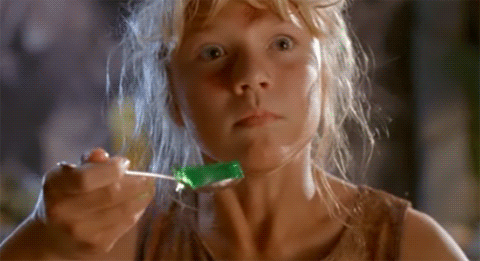
Okay, film analysis aside, the experience of watching Jurassic Park was just as spectacular as it was the first time I ever saw it as a kid. I think it’s easy to argue that Jurassic Park isn’t as action-packed as it could be, but that’s what the sequels are for. This movie finds success in introducing this world that humans have very little understanding of. Audiences were seeing lifelike dinosaurs for the first time in their lives. We had so little understanding, in fact, that paleontology and the study of dinosaurs have changed so much since the film’s release in 1993 that Jurassic Park 4 is going to have a hard time deciding between the newer discoveries of dinosaurs and the science of the first film.
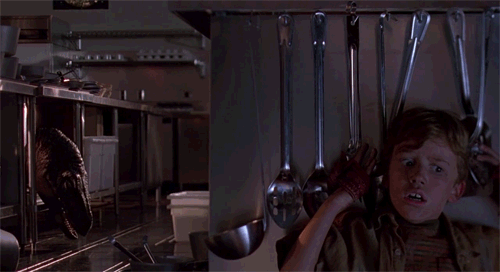
My favorite scene by far is the raptors chasing the kids. Nothing shows character development like Lex, the granddaughter, pushing her brother through to the kitchen and outsmarting the highly terrifying velociraptors. Just a few scenes ago we saw her naïvely swinging a flashlight at the T-Rex, and now she is risking her life to lure the raptors away from her little brother. Even better, we see the shocking intellectual power of the raptors, who learn to open doors in a matter of seconds? Just awesome.
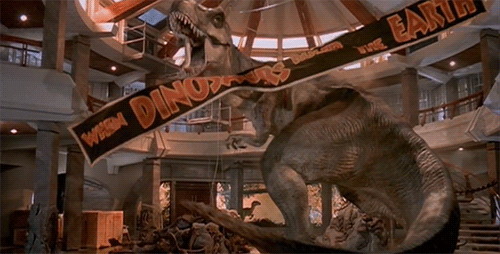
Since unfortunately I can’t go on forever, I want to end with this gif. The film is a question of man’s so-called "destiny” to control mother nature. The whole film pits the ideas of science and nature against one another. Evolution versus genetics, dinosaurs versus humans, the whole thing is a giant struggle of our scientific development to outsmart mother nature, and unfortunately for the lawyer, Samuel L. Jackson, a security guard, and a crazy short-shorts wearing hunter, we lose. The scientists say all the dinosaurs are female, and yet Dr. Grant finds eggs in the enclosure. John Hammond assures the guests that he has everything under control, and it’s really the dinosaurs that take control of the park. As science marches on, Jurassic Park is a reminder that not everything is so easily bent to our will, and when suddenly the earth’s most powerful reptiles are thrown in the mix, well, “that’s chaos theory.”

